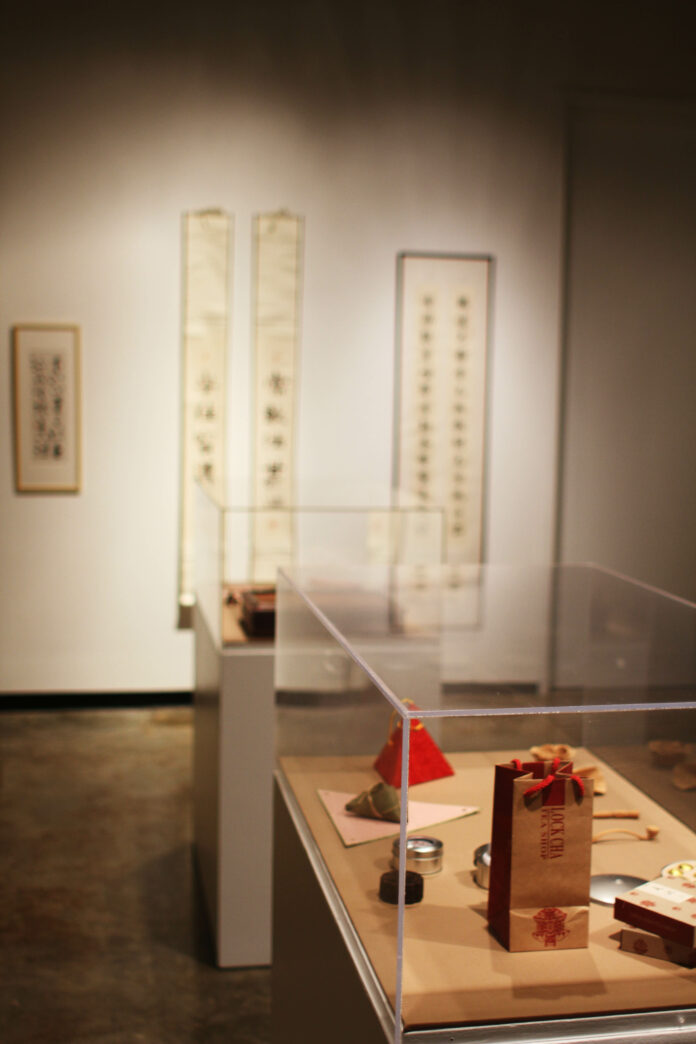On Nov. 22, internationally-recognized Tea Master Wingchi Ip and former curator of Asian Arts at the Fogg Museum and the Saint Louis Art Museum Dr. Steven D. Owyoung will speak to present the Wingchi Ip and the Art of Tea exhibition that is being shown at the Nelson Gallery from Nov. 15 to Dec 15.
Sponsored by the Department of Art and Art History, East Asian Studies, the Davis Humanities Institute, the UC Davis Confucius Institute, Alan Templeton and Darrell Corti, the colloquium will take place at the Nelson Gallery, from 3 to 5 p.m. Both Ip and Dr. Owyoung will describe the centuries-long culture of tea, to explain the calligraphy and materials relating to tea featured in the exhibition.
The exhibition largely displays books about tea and tea culture found in the UC Davis Special Collections Department, and tea paraphernalia from the Katharine Burnett and Bob Moustakas Collection.
A few students were granted the opportunity to help curate the exhibition, such as fifth-year art studio major, Roxanne Faure, who described what specifically is featured in the exhibit.
“The focus of this exhibit and of UC Davis’ study of tea is not primarily about East Asian art, but tea around the world,” Faure said in an email interview. “The exhibition features a selection of books and cards from Special Collections’ Hurt-Peck Beverage Library and general Special Collections holdings, along with two poems on scrolls written by visiting Tsiologist Wingchi Ip, one of the foremost tea experts in China and who has been instrumental in disseminating quality teas and information about them.”
Many departments from different areas of discipline at UC Davis have become influenced by these tea-related collections. This has encouraged research in nutrition, agriculture and other areas, so the creation of this exhibit seemed fitting, attracting many fields.
“Professor Katharine Burnett has been working closely with our school librarians to find and catalog books in the Shields Library that deal with tea,” Faure said. “Since UC Davis is beginning to study tea across departments and we’re having all these marvelous tea-related events, Axel Borg, a librarian in the biology and agriculture department of Shields, had the idea of creating this exhibit of materials from Special Collections on tea and offered to have students from Professor Burnett’s seminar curate it.”
Fourth-year international relations major and art history minor Ashley Cook was also offered this opportunity to curate. She described her and Roxanne’s specific roles as curators of the exhibition in an email.
“I found the opportunity in Professor Katharine Burnett’s proseminar class about tea, part of the AHI 190 series,” Cook said. “My role, as well as Roxanne’s, has primarily been invested in identifying and organizing materials for the collection, which is not an easy feat when looking at the 256 results that come up when searching ‘tea’ in the Special Collections Database.”
To present this compilation of tea-related items that Roxanne Faure and Ashley Cook had the opportunity to arrange, UC Davis had Wingchi Ip himself come, along with tea historian Dr. Owyoung.
Wingchi Ip is a tea master, tea scholar, artist and director of Lock Cha Tea Shop, where he is a tea exporter, manufacturer and retailer in Hong Kong. He is also the former head of the Fujian Tea Research Institute, in Fu’an China. At the colloquium, he will describe “The Way(s) of Drinking Tea,” where he will explain how to select, brew and taste teas, as well as explain the differences between the primary types of Chinese teas on the market, such as green, fermented, semi-fermented and white teas.
Following Ip’s detailed description of the different ways to drink tea, Dr. Owyoung, will present his “Drinking from the Dragon’s Well: An Introduction to the Tea Cultures of China, Korea and Japan.” This is an hour-long presentation of the historical figures and events that inspired the evolution of tea from a beverage to a philosophical and spiritual pursuit. Dr. Owyoung is an expert in the subject, and has concentrated on the translation of texts and poetry related to tea.
“‘Drinking from the Dragon’s Well’ offers a history of tea from the seventh through 19th centuries,” Dr. Owyoung said in an email. “The illustrated presentation will cover three civilizations and shows the transmission of tea over time between continental China and its transformation by peninsular Korea and the archipelago of Japan.”
As a near-universal drink in Asia, tea has for millennia had a great cultural influence that continues to this day. Its use seems to demands a mastery of knowledge, technique and form, all of which contribute to the notion of performance, grace and formality, making it an art form.
“The talk will explore various historical and aesthetic movements of each of the three Asian cultures, including the Daoist origins of tea, the import of monastic practices, the philosophical bases of tea and their expression in the arts,” Dr. Owyoung said. “Tea should be seen as an art, because of its preparation, service and appreciation. In its various forms fine tea was and still is a costly commodity.”
As tea has taken on a great importance even in the United States, this talk helps trace the culture of the art back to its roots. Wingchi Ip and Dr. Owyoung will present this journey at the colloquium, where one can anticipate beverages and a chance to explore future opportunities for studying the art, history and science of tea on our campus.




